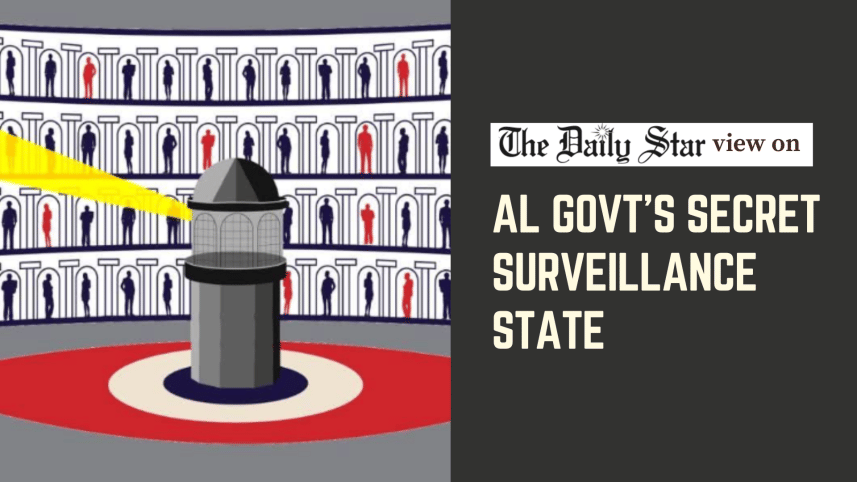A chilling revelation of state policing

A recent investigation by this daily into the state surveillance system built by the Awami League government has revealed disturbing details. The report outlines how the ousted regime constructed a digital infrastructure capable of tracking, monitoring, and intercepting end-to-end communication as well as targeting specific individuals. The extent to which this system was used against citizens remains unclear, however. What's more, a year after the fall of the regime, it is not clear how the system is being used at present.
According to our investigation, between 2016 and 2024, the National Telecommunication Monitoring Center (NTMC), Rapid Action Battalion (Rab), and various units of police collectively purchased surveillance equipment worth Tk 1,382 crore. These included IMSI catchers, GPS trackers, mobile and vehicle-mounted signal jammers, speaker recognition systems, and tools capable of intercepting encrypted communication and injecting spyware. Ostensibly, this massive infrastructure was built to "pinpoint targets" actively and passively threatening national security. In reality, as we saw over the years, it was also used to target individuals for dubious arrests, enforced disappearances, and even extrajudicial killings. What was supposed to protect the people ultimately became a tool of oppression against critics and political opponents.
Worse still, this level of surveillance was legally authorised. As a security expert explained to this daily, Bangladesh's surveillance system is "rooted in colonial-era laws that permit spyware use, communication interception, and broad law enforcement access without adequate safeguards." While state surveillance can be necessary to prevent crime, gather intelligence, and address threats to public safety and national security, without proper checks and balances it becomes open to abuse, serving the agendas of the ruling authorities of the day. This leads to violations of people's constitutional rights to privacy, due process, and dignity—something we saw happen repeatedly under the previous regime.
Unfortunately, although more than a year has passed since Awami League's fall, there has been no tangible action by the interim administration to neutralise or dismantle this digital policing system. There is still no clarity on whether—or how—this massive surveillance apparatus, built at the cost of crores of taxpayers' money, is being used. Establishing transparency and accountability must be a prerequisite when it comes to state surveillance. The administration must outline a clear plan to neutralise the system and restrict its use solely to matters of national security and combating serious crime.
One way to do it is to establish an independent oversight body to monitor the activities of the executive branch and the security forces, including intelligence agencies. Another is to introduce strong legal safeguards to prevent abuse of the surveillance system and curb executive overreach. Surveillance may at times be necessary, but it must never override citizens' civic and human rights.



 For all latest news, follow The Daily Star's Google News channel.
For all latest news, follow The Daily Star's Google News channel.
Comments